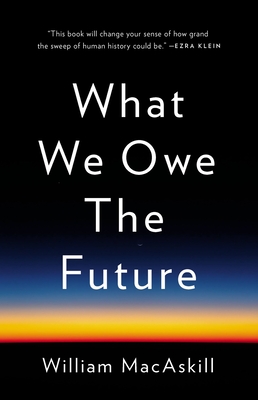Fantastic read
4 stars
Really eye opening the way MacAskill presents his arguments. He gives great examples and makes a very stong case for a better future.

Paperback, 352 pages
Published Sept. 29, 2022 by Oneworld.
An Oxford philosopher makes the case for “longtermism” — that positively influencing the long-term future is a key moral priority of our time.
The fate of the world is in our hands. Humanity’s written history spans only five thousand years. Our yet-unwritten future could last for millions more — or it could end tomorrow. Astonishing numbers of people could lead lives of great happiness or unimaginable suffering, or never live at all, depending on what we choose to do today.
In What We Owe The Future, philosopher William MacAskill argues for longtermism, that idea that positively influencing the distant future is a key moral priority of our time. From this perspective, it’s not enough to reverse climate change or avert the next pandemic. We must ensure that civilization would rebound if it collapsed; counter the end of moral progress; and prepare for a planet where the smartest beings …
An Oxford philosopher makes the case for “longtermism” — that positively influencing the long-term future is a key moral priority of our time.
The fate of the world is in our hands. Humanity’s written history spans only five thousand years. Our yet-unwritten future could last for millions more — or it could end tomorrow. Astonishing numbers of people could lead lives of great happiness or unimaginable suffering, or never live at all, depending on what we choose to do today.
In What We Owe The Future, philosopher William MacAskill argues for longtermism, that idea that positively influencing the distant future is a key moral priority of our time. From this perspective, it’s not enough to reverse climate change or avert the next pandemic. We must ensure that civilization would rebound if it collapsed; counter the end of moral progress; and prepare for a planet where the smartest beings are digital, not human.
If we make wise choices today, our grandchildren’s grandchildren will thrive, knowing we did everything we could to give them a world full of justice, hope and beauty.
Really eye opening the way MacAskill presents his arguments. He gives great examples and makes a very stong case for a better future.
I think there are many details to be disagreed with in this book, but I'm sold on the over arching argument of the necessity to think the future carefully.
I'm new to the topic of longtermism and found it a sold introduction to the subject.
As other reviews have pointed out there are many flaws. Explanations can some times feel a bit rushed or that things are brushed over. Topics that you would have like to seen included are merely hinted at, while other topics that seem less important are more fully developed.
I found some of the conclusions disagreeable - particularly when talking about the lost ecosystems and biodiversity being an acceptable consequence of human expansion. (Although, to be fair, in these cases the arguments are well developed and the author is careful state that moral / ethical views of such arguments are far from being agreed.)
The last …
I think there are many details to be disagreed with in this book, but I'm sold on the over arching argument of the necessity to think the future carefully.
I'm new to the topic of longtermism and found it a sold introduction to the subject.
As other reviews have pointed out there are many flaws. Explanations can some times feel a bit rushed or that things are brushed over. Topics that you would have like to seen included are merely hinted at, while other topics that seem less important are more fully developed.
I found some of the conclusions disagreeable - particularly when talking about the lost ecosystems and biodiversity being an acceptable consequence of human expansion. (Although, to be fair, in these cases the arguments are well developed and the author is careful state that moral / ethical views of such arguments are far from being agreed.)
The last section "Taking Action" is less developed that I would have liked. It consists of just one chapter and feels more like an acknowledgement that there are a lot of things that one could do to help future generations.
Still despite it flaws, I think this book still deserves the five star rating I've given it. Any introductory text needs to make choices and that the reading isn't always going to agree with. There is much that I found thought provoking and many references to other texts for further reading, if you wish to dig deeper.
If you are someone that would like to improve the world for current and future generations and are looking for an introductory text, then I think this is a good place to start.